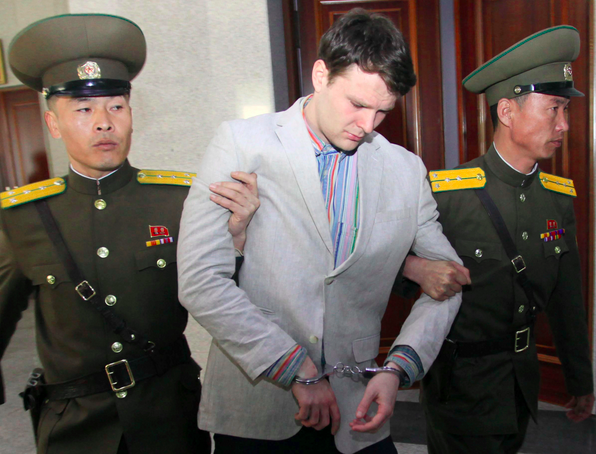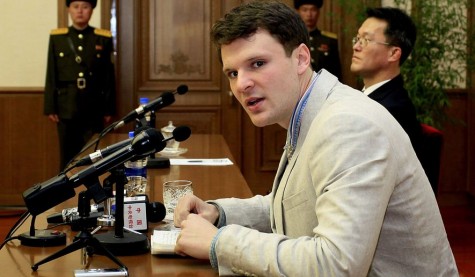
An American student was sentenced to 15 years of hard labor in North Korea for “crimes against the state” on March 16. The 21-year-old University of Virginia student, Otto Warmbier, allegedly stole a political propaganda poster from a Pyongyang hotel.
Warmbier was brought before North Korea’s Supreme Court for a one-hour trial, which resulted in his conviction and sentence. He claimed the poster was to be used as a souvenir for his local church in Wyoming and apologized for the act, visibly emotional, saying taking the poster was the worst mistake he had ever made.
White House Press Secretary Josh Earnest claimed that the alleged crime “would not give rise to arrest or imprisonment in the United States or any other country in the world.” Many are referring to the crime as nothing beyond a college prank and the sentence as being unnecessarily brutal, including Human Rights Watch, which stated that “North Korea’s sentencing of Warmbier to 15 years hard labor for a college-style prank is outrageous and shocking, and should not be permitted to stand.”

The arrest comes at a time characterized by a tense relationship between the United States and North Korea over the communist country’s vigorous missile program, of which the U.S. has countered with tough economic sanctions.
Press Secretary Earnest accused North Korea of using “U.S. citizens as pawns to pursue a political agenda.” This is a suggestion that the totalitarian government is using the American prisoner as possible leverage for future negotiations with the United States.
Officially, the United States has been in a state of war with North Korea since the Korean War, which was halted by an armistice in 1953.
North Korea, officially the Democratic People’s Republic of Korea, was formed in 1945 when the Soviet Union occupied the Korean peninsula above the 38th parallel and the United States occupied the lower half of what would today be South Korea. North Korea has operated political prison camps since the early 1950s and has used them to silence all perceived dissent through detention, torture, and labor.
The nation has continually denied the existence of the camps, and a lack of transparency in the isolated nation’s government makes it difficult for human rights groups to truly understand the scope of the camps. A 2014 United Nations report, which combined satellite imagery and human testimony, stated that “unspeakable atrocities” and systematic, inhumane treatment occurred within the camps.
Despite the oppressive nature of the North Korean regime, many still venture to the nation as part of the few tourist groups permitted to enter the country each year. The U.S. State Department has routinely issued travel warnings for the nation, citing “the risk of arrest and long-term detention due to the DPRK’s [Democratic People’s Republic of Korea] inconsistent application of its criminal laws.” The United States maintains no embassy within North Korea and relies on the Swedish Embassy to act as the U.S. Protecting Power in negotiations. Only 13 Americans have been held in North Korea since 1996 for no longer than two years on charges ranging from illegal entry into North Korea, unauthorized religious activity and perceived hostile acts against the government.
As the actions of an isolated North Korea become increasingly unpredictable, what will happen to Warmbier remains uncertain. His sentencing may be carried out in its entirety or he may be released early if negotiations are successful.









































